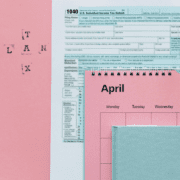Tax Planning & Preparation Tips
As the year comes to a close, it’s important to start planning your 2021 taxes sooner rather than later. Dealing with taxes is inevitable. Allocating time and energy into tax planning can save you time, possibly reduce your tax burden, ensure your return is accurately filed, and help you avoid unexpected delays with your refund.
Ready to get started? Review these simple steps to make tax filing easier in 2022 and/or schedule an appointment with your trusted accounting advisor.
What Can You Do Now?
1) Log in to your IRS online account to:
- View the amounts of any Economic Impact Payments (stimulus money) you received
- Gain access to the Child Tax Credit portal (and what you received in advanced Child Tax Credit payments). Get organized by reconciling your payments.
- View your most recent tax return, records, and transcripts
- View details of any payment plan you may have
- View your payment history (up to 5 years) along with any pending/scheduled payments
If you don’t have an IRS online account – create one today.
2) Get Your Documents in Order
Make a list of what tax documents you are expecting. Gather them together to ensure your return is accurate and complete. Tax records you should be on the lookout for include:
- W-2 (from your employer)
- 1099s from banks and financial institutions, issuing agencies, and other payers, including:
- investment transactions (interest, dividends, and capital gains)
- retirement income (pension or annuity)
- unemployment
- 1099-K, 1099-MISC, or any other income statement
- Records of any virtual currency transactions
- 1095-A Health Insurance Statement
- Letter 6419 (Advance Child Tax Credit Payments)
- Letter 6475 (Economic Impact Payments)
- Charitable donation letters/receipts
- Create a list of estimated tax payments, including the amount and date for each
- If you have significant out-of-pocket medical expenses, create a list and total by category (prescription; health insurance; doctors, etc.)
- If you are unsure if an event created a tax filing transaction, it is best to check with your preparer prior to tax filing time. Most times, it is best to check before the transaction occurs.
Once the list is complete, and all documents are accounted for, deliver them to your accountant.
3) Check Your Individual Tax Identification Number (ITIN)
Renew an ITIN if it has expired and if it is needed on a tax return.
4) Check Your Withholdings
Life changes such as marriage, divorce, welcoming a child, or taking on a second job are reasons you should review your withholding.
Visit the IRS Tax Withholding Estimator to ensure you have the right amount of tax withheld from your paycheck.
5) Consider Direct Deposit
Direct Deposit is the fastest and most accurate way to get your tax refund.
Other Things to Consider When Preparing and Planning:
Child Tax Credit Payments
If you received Advance Child Tax Credit Payments, you will need to compare the payments you received with the amount of the Child Tax Credit that you can properly claim on your 2021 return.
Claim Recovery Rebate Credit
Individuals who did not qualify for the third Economic Impact Payments (or didn’t receive the full amount) may be eligible for the Recovery Rebate Credit on their 2021 tax return if certain income thresholds have changed as compared to 2020.
If you did receive the full amount for your third Economic Impact Payment, you won’t include any information on your 2021 tax return; however, please inform your tax preparer that you received it in full.
If you ARE eligible, you’ll need to file a 2021 tax return (even if you don’t usually file) to claim the Recovery Rebate Credit, and you didn’t get the full amount of the third Economic Impact Payment.
Avoid Delays / Understand the Timing
The IRS issues most refunds in less than 21 days but cautions taxpayers not to rely on receiving a refund by a certain date, especially when making major purchases or paying bills. Some returns (e-filed OR paper) may need additional review/processing times. If you want to try to avoid unnecessary delays, have your accountant file the return electronically.
Getting your documents to your tax preparer as early as you are able is helpful, as long as it is the majority of the items. Providing documents in a piecemeal way is not recommended. Tracking is much more time-consuming than if received all at once.
Also, note that refunds for those claiming the Earned Income Tax Credit (EITC) or Additional Child Tax Credit (ACTC) can’t be issued before mid-February because the law requires the IRS to hold the entire refund − even the portion not associated with EITC or ACTC.
The end of 2021 is fast approaching. Bookmark the IRS website for resources and tools – https://www.irs.gov/help/telephone-assistance or consult with Leone, McDonnell & Roberts, PA – your trusted accounting professional.










